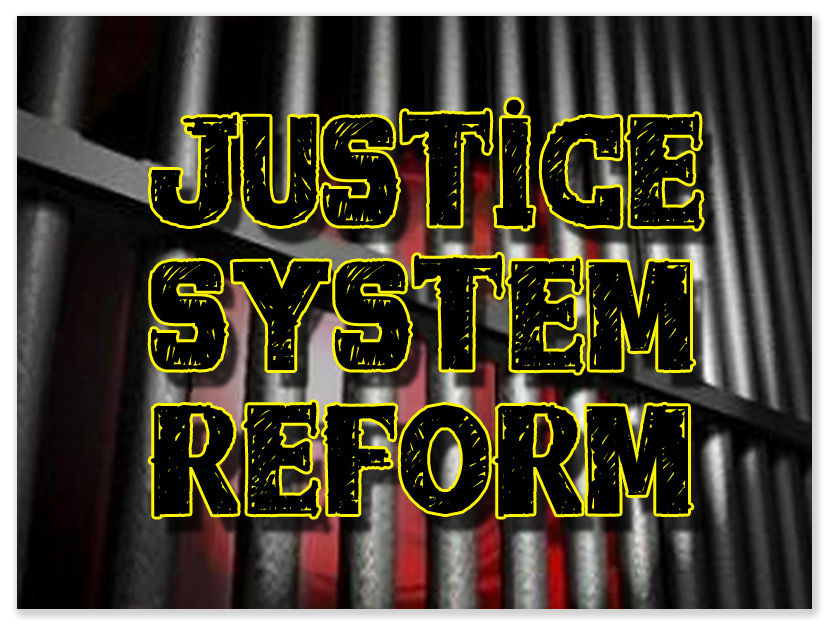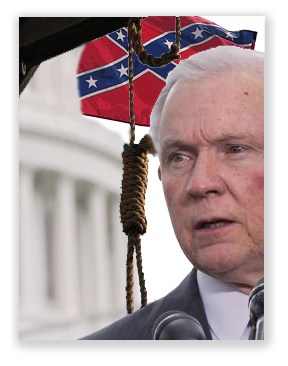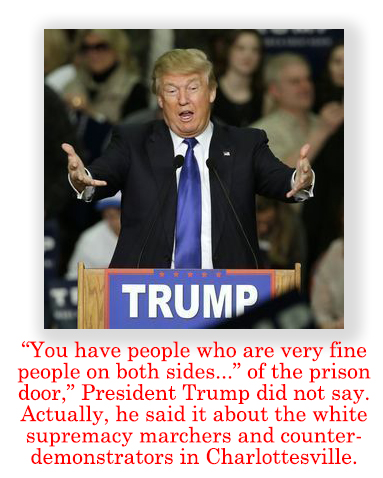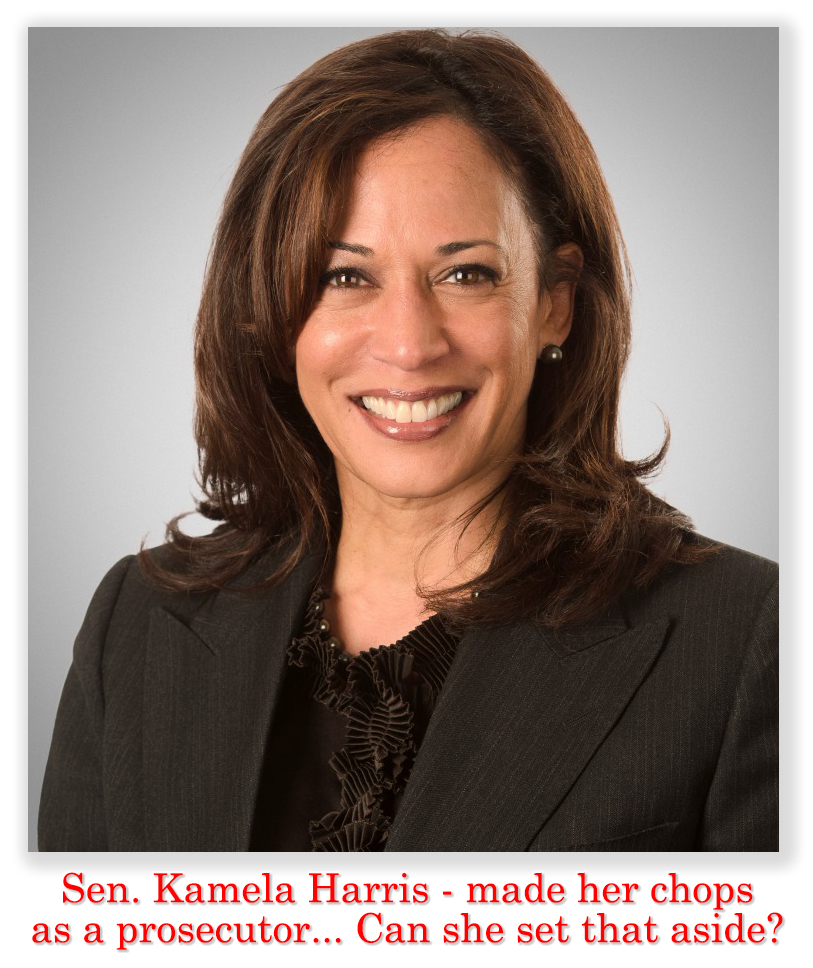We post news and comment on federal criminal justice issues, focused primarily on trial and post-conviction matters, legislative initiatives, and sentencing issues.
TRUMP HOLDS WHITE HOUSE MEETING ON SENTENCING REFORM
 President Trump and Jared Kushner, his son-in-law and senior adviser, met with criminal justice reform advocates last Thursday on prison reform and re-entry, as well as the successes states such as Georgia, Kansas and Kentucky have had in enacting programs aimed at reducing recidivism rates and rehabilitating inmates. The White House described the meeting as being intended to explore strategies to “equip nonviolent prisoners with the skills and opportunities needed for an honest second chance to correct their course in life and return to society as productive, law-abiding citizens.”
President Trump and Jared Kushner, his son-in-law and senior adviser, met with criminal justice reform advocates last Thursday on prison reform and re-entry, as well as the successes states such as Georgia, Kansas and Kentucky have had in enacting programs aimed at reducing recidivism rates and rehabilitating inmates. The White House described the meeting as being intended to explore strategies to “equip nonviolent prisoners with the skills and opportunities needed for an honest second chance to correct their course in life and return to society as productive, law-abiding citizens.”
Trump said his administration is committed to helping former inmates become productive, law abiding members of society. “Two-thirds of the 650,000 people released from prison each year are arrested again within three years. We can help break this vicious cycle through job training, very important, job training, mentoring and drug addiction treatment… We’ll be very tough on crime, but we will provide a ladder of opportunity for the future.”
A White House official told The Hill that prison reform was discussed at the presidential retreat at Camp David a week ago weekend and that the Administration has been hosting roundtable discussions on prison reform and re-entry since last summer.

Guests at Thursday’s meeting included Matt Schlapp, board chairman of the American Conservative Union; Brooke Rollins, president of the Texas Public Policy Foundation; Republican Governors Matt Bevin (Kentucky) and Sam Brownback (Kansas); Koch Industries general counsel Mark Holden; and Shon Hopwood, a former federal inmate who is now an associate professor at Georgetown University Law Center and a member of the FAMM Board of Directors. Thursday’s discussion also included Attorney General Jefferson Beauregard Sessions III and Trump’s chief of staff, Gen. John Kelly.
The meeting emboldened some advocates who saw it as a sign the White House is officially on board with criminal justice reform. “It has long been an excuse used on the Hill that we need to see where the White House is on this issue and this is the positive signal the folks on the Hill have been waiting on,” said Holly Harris, executive director of Justice Action Network. “I don’t think there’s going to be any more justifications to hold up this legislation,” she said.
Holden came away from the meeting with a sense of optimism. The President Trump was an active participant during the 45-minute session. “I saw some passion there,” he said. “He seemed like he got the issue, understood it and connected with it.” Holden said he hopes prison reform can be the start to broader federal criminal justice reform.
Rollins said, “I really think the White House is looking at lots of different avenues forward,” from congressional action to executive orders. Sessions, who has criticized granting leniency to drug offenders and supports mandatory minimums, suggested at the meeting he might be open to compromise on ideas such as job training. “The president talking about prison reform is a good thing,” said Kevin Ring, president of FAMM.
The meeting was not without its critics. Mark Mauer, executive director of the Sentencing Project, said, “more re-entry programming, the kind Kushner is suggesting, would be welcome, but a sole focus on that initiative reveals two grievous flaws. First, the programming provisions being discussed on Capitol Hill contain no funding allocation. Apparently, there is hope that faith-based organizations will emerge to provide these services pro bono… Second, dropping the sentencing provisions of the Grassley-Durbin legislation from the Trump administration’s reform conversations guarantees that there will be no significant inroads made into reversing mass incarceration. Thousands of federal drug defendants will be sentenced to decades of incarceration and resources will be squandered that could more effectively be directed to prevention and treatment initiatives.”
 Others have objected that the meeting does not include any liberal groups. However, an anonymous conservative participant told Reuters that “excluding organizations that are seen as liberal, like the ACLU or the NAACP, and leaving out sentencing reform was necessary to gain thetea leaves, I think what they’ve done is sat down with Mr. Sessions and got him to agree to part of the reforms,” said the conservative leader, who requested anonymity in order to freely discuss the issue.
Others have objected that the meeting does not include any liberal groups. However, an anonymous conservative participant told Reuters that “excluding organizations that are seen as liberal, like the ACLU or the NAACP, and leaving out sentencing reform was necessary to gain thetea leaves, I think what they’ve done is sat down with Mr. Sessions and got him to agree to part of the reforms,” said the conservative leader, who requested anonymity in order to freely discuss the issue.
Meanwhile, the American Bar Association sent a letter to Sens. Charles Grassley (R-Iowa) and Diane Feinstein (D-California), in support of the Sentencing Reform and Corrections Act of 2017. ABA President Hilarie Bass said that while the ABA was “disappointed by the inclusion of some new mandatory minimum sentencing provisions in the current draft, we believe that S. 1917 will, overall, create a more just criminal justice system than the one currently in place. Enactment will help focus prosecutorial and correctional resources on offenders who commit serious crimes that pose the greatest risk to public safety and will permit more sentencing flexibility for low-level, nonviolent offenders whose role and culpability will now receive more careful and balanced consideration by sentencing judges. It will also expand recidivism-reducing programs and juvenile justice reform to make sure that those in prison have a chance to reintegrate into society.”’
Finally, Sen. Cory Booker (D-New Jersey) and Sen. Kamala Harris (D-California) were both named to the Senate Judiciary Committee last week. Sen. Booker has sponsored criminal justice reform legislation in the past, and is a co-sponsor of SRCA17. Sen. Harris has occasionally supported criminal justice reform, such as when she joined with Sen. Rand Paul (R-Kentucky) to back bail reform.
 Some question Sen. Harris’s sincerity, however. As San Francisco’s district attorney and then as California’s attorney general, Harris rarely strayed far from a punitive law-and-order mentality. Last week, Reason warned that “Criminal justice reformers shouldn’t get their hopes up that she’ll be a reliable ally. During her time as San Francisco’s district attorney, Harris oversaw the city’s mismanaged crime lab. A San Francisco superior court judge ruled that the D.A.’s office ignored demands that it take responsibility for the lab’s failings, and that it violated defendants’ rights by hiding information about a corrupt technician who had been stealing cocaine.”
Some question Sen. Harris’s sincerity, however. As San Francisco’s district attorney and then as California’s attorney general, Harris rarely strayed far from a punitive law-and-order mentality. Last week, Reason warned that “Criminal justice reformers shouldn’t get their hopes up that she’ll be a reliable ally. During her time as San Francisco’s district attorney, Harris oversaw the city’s mismanaged crime lab. A San Francisco superior court judge ruled that the D.A.’s office ignored demands that it take responsibility for the lab’s failings, and that it violated defendants’ rights by hiding information about a corrupt technician who had been stealing cocaine.”
The Hill, Trump, Kushner meet with advocates on prison reform (Jan. 11, 2018)
Newsweek, Trump and Kushner’s prison reform plan not expected to reduce sentences or fix prison conditions (Jan. 11, 2018)
Reason.com, Kamala Harris: No Friend to Criminal Justice Reform (Jan. 12, 2018)
– Thomas L. Root 
